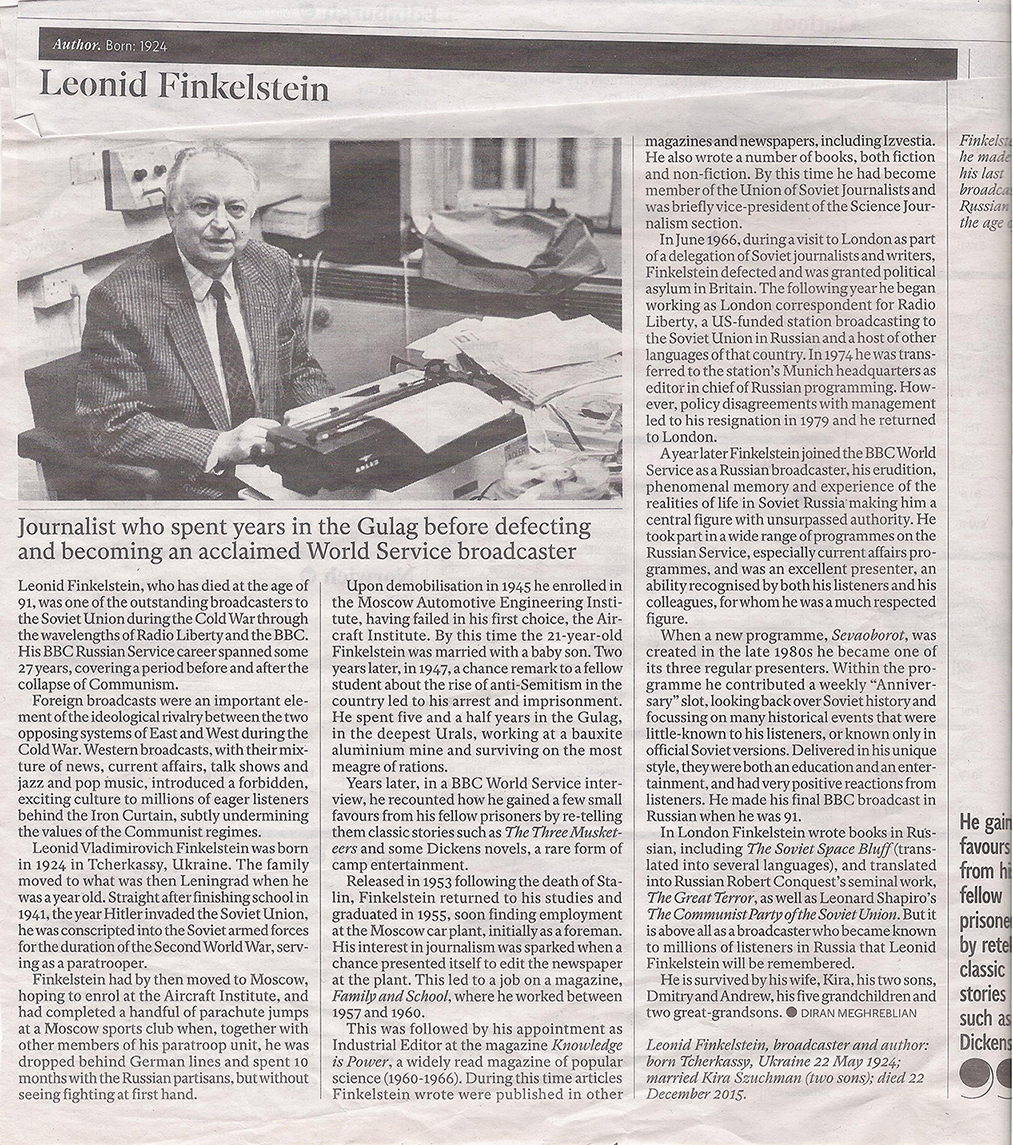

Некролог Леонида Владимирова (Леонида Владимировича Финкельштейна), написанный нашим коллегой по русской службе Би-Би-Си Дираном Мегребляном, был напечатан в газете Индепендент 25 января 2016 года.

Leonid Finkelstein
JOURNALIST WHO SPENT YEARS IN THE GULAG BEFORE DEFECTING AND BECOMING AN ACCLAIMED WORLD SERVICE BROADCASTER
Leonid Finkelstein, who has died at the age of 91, was one of the outstanding broadcasters to the Soviet Union during the Cold War through the wavelengths of Radio Liberty and the BBC. His BBC Russian Service career spanned some 27 years, covering a period before and afterthe collapse of Communism.
Foreign broadcasts were an important element of the ideological rivalry between the two opposing systems of East and West during the Cold War. Western broadcasts, with their mixture of news, current affairs, talk shows and jazz and pop music, introduced a forbidden, exciting culture to millions of eager listeners behind the Iron Curtain, subtly undermining the values of the Communist regimes.
Leonid Vladimirovich Finkelstein was born in 1924 in Tcherkassy, Ukraine. The family moved to what was then Leningrad when he was a year old. Straight after finishing school in 1941, the year Hitler invaded the Soviet Union, he was conscripted into the Soviet armed forces for the duration of the Second World War, serving as a paratrooper.
Finkelstein had by then moved to Moscow, hoping to enrol at the Aircraft Institute, and had completed a handful of parachute jumps at a Moscow sports club when, together with other members of his paratroop unit, he was dropped behind German lines and spent 10 months with the Russian partisans, but without seeing fighting at first hand.
Upon demobilisation in 1945 he enrolled in the Moscow Automotive Engineering Institute, having failed in his first choice, the Aircraft Institute. By this time the 21-year-old Finkelstein was married with a baby son. Two years later, in 1947, a chance remark to a fellow student about the rise of anti-Semitism in the country led to his arrest and imprisonment. He spent five and a half years in the Gulag, in the deepest Urals, working at a bauxite aluminium mine and surviving on the most meagre of rations.
Years later, in a BBC World Service interview, he recounted how he gained a few small favours from his fellow prisoners by re-telling them classic stories such as The Three Musketeers and some Dickens novels, a rare form of camp entertainment.
Released in 1953 following the death of Stalin, Finkelstein returned to his studies and graduated in 19S5, soon finding employment at the Moscow car plant, initially as a foreman. His interest in journalism was sparked when a chance presented itself to edit the newspaper at the plant. This led to a job on a magazine, Family and School, where he worked between 1957 and 1960.
This was followed by his appointment as Industrial Editor at the magazine Knowledge is Power, a widely read magazine of popular science (1960-1966). During this time articles Finkelstein wrote were published in other magazines and newspapers, including Izvestia. He also wrote a number of books, both fiction and non-fiction. By this time he had become member of the Union of Soviet Journalists and was briefly vice-president of the Science Journalism section.
In June 1966, during a visit to London as part of a delegation of Soviet journalists and writers, Finkelstein defected and was granted political asylum in Britain. The following year he began working as London correspondent for Radio Liberty, a US-funded station broadcasting to the Soviet Union in Russian and a host of other languages of that country. In 1974 he was transferred to the station's Munich headquarters as editor in chief of Russian programming. However, policy disagreements with management led to his resignation in 1979 and he returned to London.
A year later Finkelstein joined the BBC World Service as a Russian broadcaster, his erudition, phenomenal memory and experience of the realities of life in Soviet Russia making him a central figure with unsurpassed authority. He took part in a wide range of programmes on the Russian Service, especially current affairs programmes, and was an excellent presenter, an ability recognised by both his listeners and his colleagues, for whom he was a much respected figure.
When a new programme, Sevaoborot, was created in the late 1980s he became one of its three regular presenters. Within the programme he contributed a weekly «Anniversary» slot, looking back over Soviet history and focussing on many historical events that were little-known to his listeners, or known only in official Soviet versions. Delivered in his unique style, they were both an education and an entertainment, and had very positive reactions from listeners. He made his final BBC broadcast in Russian when he was 91.
In London Finkelstein wrote books in Russian, including The Soviet Space Bluff (translated into several languages), and translated into Russian Robert Conquest's seminal work, The Great Terror, as well as Leonard Shapiro's The Communist Party of the Soviet Union. But it is above all as a broadcaster who became known to millions of listeners in Russia that Leonid Finkelstein will be remembered.
He is survived by his wife, Kira, his two sons, Dmitry and Andrew, his five grandchildren and two great-grandsons.
DIRAN MEGHREBLIAN
Leonid Finkelstein, broadcaster and author: born Tcherkassy, Ukraine 22 May 1924.; married Kira Szuchman (two sons); died 22 December 2015.